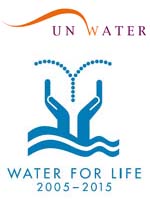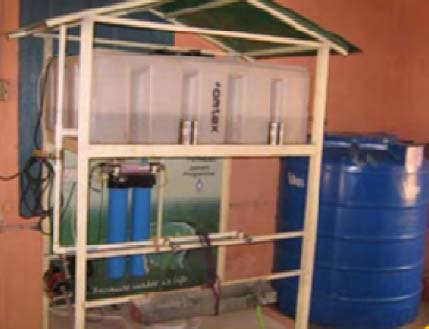Water Management
Disaster management in India – A report by Ministry of Home Affairs
Posted on 09 Sep, 2011 05:28 PMThe perception about disaster and its management has undergone a change following the enactment of the Disaster Management Act, 2005. The definition of disaster is now all encompassing, which includes not only the events emanating from natural and man-made causes, but even those events which are caused by accident or negligence.
Frequently asked questions (FAQ) on Groundwater - Understanding the basics
Posted on 08 Sep, 2011 04:56 PMA comprehensive FAQ Manual on Groundwater authored by Dr Mihir Kumar Maitra narrows down the existing knowledge gaps amongst the common groundwater users.
The most popular FAQs are listed below. Please click on a topic to view more detailed information:
Basic information on groundwater

Basanti and the Kosi: How one woman revitalized a watershed in Uttarakhand
Posted on 07 Sep, 2011 03:22 PMGuest post by: Chicu
UN-Water invites nominations for the second edition of the ‘Water for Life’ best practices award – Apply by September 30, 2011
Posted on 07 Sep, 2011 11:32 AMContent courtesy: Fundsforngos.org

‘Water for Life’ UN-Water Best Practices Award was started with the aim to create awareness about the importance of water among the common people and to promote and support efforts to fulfill commitments of the international community in this regard. The award process is managed by the United Nations Office to Support the International Decade for Action “Water for Life” 2005-2015/UN-Water Decade Programme on Advocacy and Communication (UNW-DPAC) and the UN World Water Assessment Programme (WWAP).
WWF invites applications for the post of Coordinator, Living Ganga Programme, Kanpur – Apply by September 20, 2011
Posted on 05 Sep, 2011 05:29 PMContent courtesy: DevNetJobsIndia

World Wildlife Fund-India (WWF-India) has been working towards conservation and wise management of river systems and wetlands in India for over a decade now. The areas of intervention have been freshwater ecosystems, connected habitats, freshwater species and balanced use of water resources for livelihoods.
Flood hazard zonation of Assam – An atlas by National Remote Sensing Centre
Posted on 05 Sep, 2011 03:09 PMAssam represents a highly flood-prone region characterized by severe hazards of floods. Although occurrence of flood has been an age-old phenomenon in the riverine areas of this region, the extent of damage caused by floods has increased significantly in recent years.
Decentralized wastewater management – An overview of a community initiatives in New Delhi - Vigyan Vijay Foundation
Posted on 05 Sep, 2011 11:40 AMThis paper by Ajit Seshadri, Vigyan Vijay Foundation highlights the poor sanitation situation in India and argues that centralized approaches to wastewater treatment have had limited success and there is a need to make wastwater treatment people centric and effective through the use of decentralized systems such as DEWATS (Decentralized Wastewater Treatment Systems). DEWATS are locally organized and people driven systems that typically comprise a settler, anaerobic baffled tanks, filter beds of gravel and sand, and an open pond. The open pond or the polishing tank recreates a living environment for the wastewater to clean itself, naturally.
Orissa Community Tank Management Project – A paper by World Bank on proposed project restructuring
Posted on 03 Sep, 2011 07:39 PMThis document provides an appraisal of the World Bank financed Orissa Community Tank Management Project. The project on tank rehabilitation in the state was focused on institutional strengthening, agricultural livelihood services and some irrigation improvements in the project area.
Forecasting agricultural output using space, agrometeorology and land based observations
Posted on 03 Sep, 2011 06:29 PMThis document presents the proceedings of the annual review meeting by India Meteorological Department (IMD) on “Forecasting Agricultural Output Using Space, Agrometeorology and Land Based Observations” (FASAL) organized at YASHADA, Pune during 1-2 August 2011.
Assessment of Jalamani programme on stand alone water purification systems in rural India - A report by Centre for Media Studies
Posted on 03 Sep, 2011 04:50 PM This report by the Centre for Media Studies, New Delhi presents an assessment of the Jalamani programme of the Department of Drinking Water Supply, Government of India. The centrally sponsored programme commenced in 2008-09 aimed at installing simple Stand Alone Water Purification Systems (SAWPS) in rural schools to enable school children to have access to safe and clean water. The focus was on tackling bacteriological contamination and turbidity in ongoing rural drinking water supply programme.
This report by the Centre for Media Studies, New Delhi presents an assessment of the Jalamani programme of the Department of Drinking Water Supply, Government of India. The centrally sponsored programme commenced in 2008-09 aimed at installing simple Stand Alone Water Purification Systems (SAWPS) in rural schools to enable school children to have access to safe and clean water. The focus was on tackling bacteriological contamination and turbidity in ongoing rural drinking water supply programme.
The assessment study used both qualitative and quantitative techniques such as focus group discussions and in-depth interviews besides structured questionnaire for a variety of stakeholders and research questions. Another important aspect of the quantitative tools was testing of the raw and treated water samples. The study was undertaken in 320 schools spread across 20 districts and six states.







